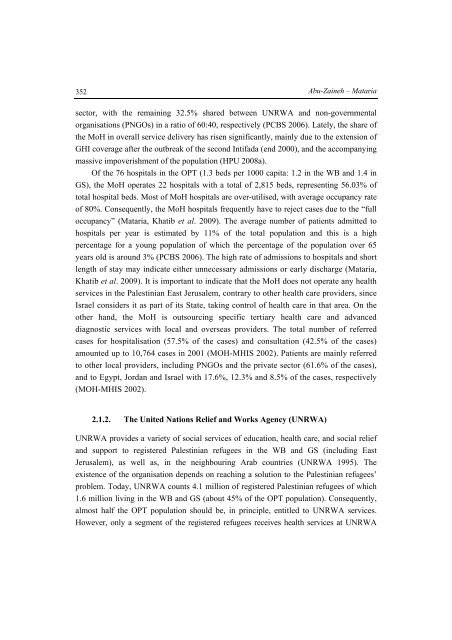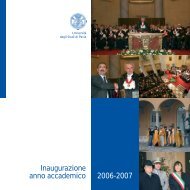The Palestinian Economy. Theoretical and Practical Challenges
The Palestinian Economy. Theoretical and Practical Challenges
The Palestinian Economy. Theoretical and Practical Challenges
You also want an ePaper? Increase the reach of your titles
YUMPU automatically turns print PDFs into web optimized ePapers that Google loves.
352<br />
Abu-Zaineh – Mataria<br />
sector, with the remaining 32.5% shared between UNRWA <strong>and</strong> non-governmental<br />
organisations (PNGOs) in a ratio of 60:40, respectively (PCBS 2006). Lately, the share of<br />
the MoH in overall service delivery has risen significantly, mainly due to the extension of<br />
GHI coverage after the outbreak of the second Intifada (end 2000), <strong>and</strong> the accompanying<br />
massive impoverishment of the population (HPU 2008a).<br />
Of the 76 hospitals in the OPT (1.3 beds per 1000 capita: 1.2 in the WB <strong>and</strong> 1.4 in<br />
GS), the MoH operates 22 hospitals with a total of 2,815 beds, representing 56.03% of<br />
total hospital beds. Most of MoH hospitals are over-utilised, with average occupancy rate<br />
of 80%. Consequently, the MoH hospitals frequently have to reject cases due to the “full<br />
occupancy” (Mataria, Khatib et al. 2009). <strong>The</strong> average number of patients admitted to<br />
hospitals per year is estimated by 11% of the total population <strong>and</strong> this is a high<br />
percentage for a young population of which the percentage of the population over 65<br />
years old is around 3% (PCBS 2006). <strong>The</strong> high rate of admissions to hospitals <strong>and</strong> short<br />
length of stay may indicate either unnecessary admissions or early discharge (Mataria,<br />
Khatib et al. 2009). It is important to indicate that the MoH does not operate any health<br />
services in the <strong>Palestinian</strong> East Jerusalem, contrary to other health care providers, since<br />
Israel considers it as part of its State, taking control of health care in that area. On the<br />
other h<strong>and</strong>, the MoH is outsourcing specific tertiary health care <strong>and</strong> advanced<br />
diagnostic services with local <strong>and</strong> overseas providers. <strong>The</strong> total number of referred<br />
cases for hospitalisation (57.5% of the cases) <strong>and</strong> consultation (42.5% of the cases)<br />
amounted up to 10,764 cases in 2001 (MOH-MHIS 2002). Patients are mainly referred<br />
to other local providers, including PNGOs <strong>and</strong> the private sector (61.6% of the cases),<br />
<strong>and</strong> to Egypt, Jordan <strong>and</strong> Israel with 17.6%, 12.3% <strong>and</strong> 8.5% of the cases, respectively<br />
(MOH-MHIS 2002).<br />
2.1.2. <strong>The</strong> United Nations Relief <strong>and</strong> Works Agency (UNRWA)<br />
UNRWA provides a variety of social services of education, health care, <strong>and</strong> social relief<br />
<strong>and</strong> support to registered <strong>Palestinian</strong> refugees in the WB <strong>and</strong> GS (including East<br />
Jerusalem), as well as, in the neighbouring Arab countries (UNRWA 1995). <strong>The</strong><br />
existence of the organisation depends on reaching a solution to the <strong>Palestinian</strong> refugees’<br />
problem. Today, UNRWA counts 4.1 million of registered <strong>Palestinian</strong> refugees of which<br />
1.6 million living in the WB <strong>and</strong> GS (about 45% of the OPT population). Consequently,<br />
almost half the OPT population should be, in principle, entitled to UNRWA services.<br />
However, only a segment of the registered refugees receives health services at UNRWA
















